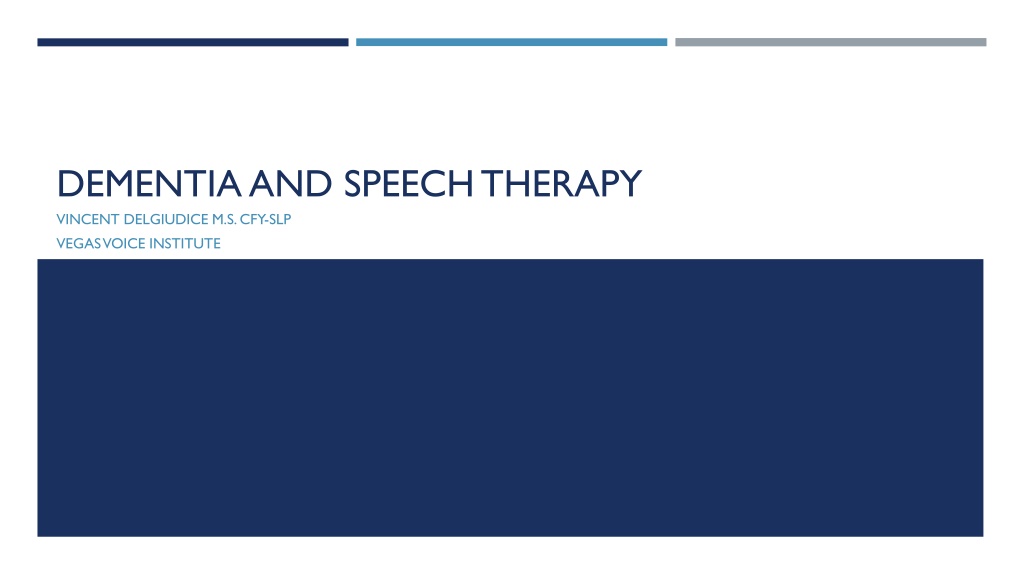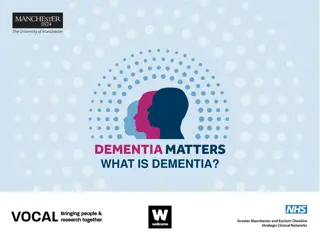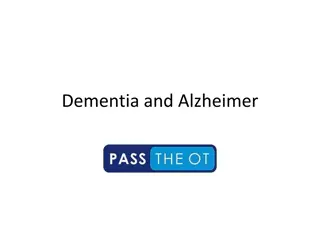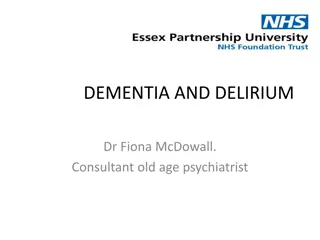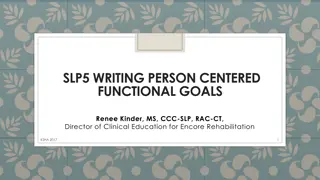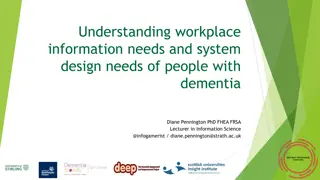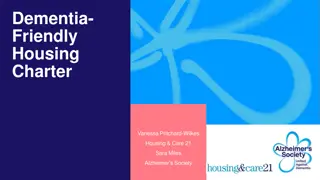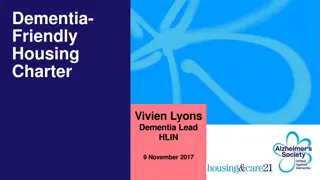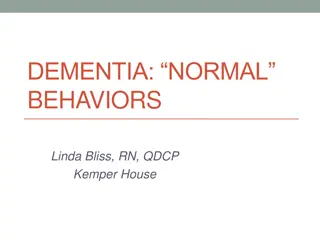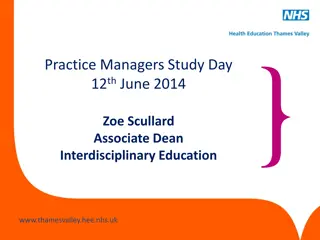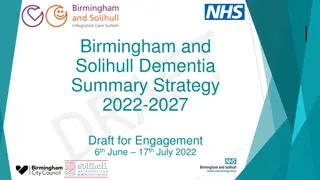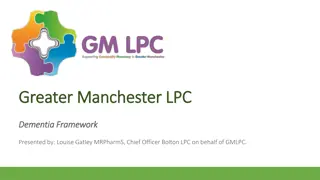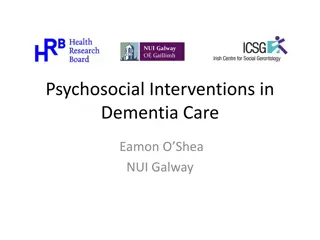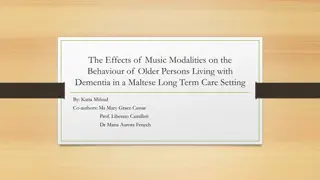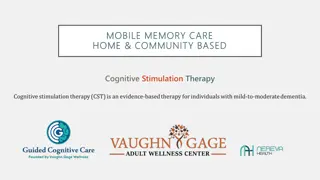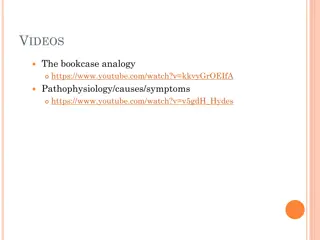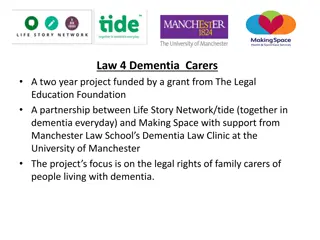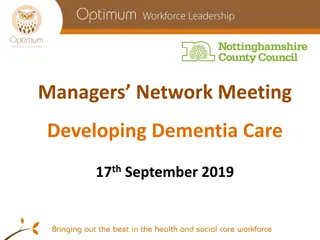Understanding Dementia and Speech Therapy by Vincent Delgiudice
Dementia impacts speech, swallowing abilities, and quality of life. Vincent Delgiudice, a certified SLP, offers therapy to enhance memory, communication, and safe swallowing strategies. Dysphagia in dementia needs evaluation for proper treatment. Learn about types of dementia symptoms and different therapy approaches like compensatory and rehabilitative strategies.
Download Presentation

Please find below an Image/Link to download the presentation.
The content on the website is provided AS IS for your information and personal use only. It may not be sold, licensed, or shared on other websites without obtaining consent from the author. Download presentation by click this link. If you encounter any issues during the download, it is possible that the publisher has removed the file from their server.
E N D
Presentation Transcript
DEMENTIA AND SPEECH THERAPY VINCENT DELGIUDICE M.S. CFY-SLP VEGAS VOICE INSTITUTE
SPEECH AND SWALLOWING Dementia affects not only a person s memory, but their ability to use language. Speech therapy can help with strategies for memory and conversational success. On the lesser known side, dementia also affects a person s ability to swallow and enjoy a meal, which leads to a decrease in the quality of life. Swallowing therapy can help provide strategies to be a safe eater and allow caregivers to feel less stress during meals.
DYSPHAGIA Despite the estimation that there will be a prevalence of 42.3 million people worldwide with dementia in 2020, there is limited research in the area of dysphagia and dementia. Dysphagia refers to the swallowing difficulties that occur in the oral cavity, pharynx, and/or esophagus. This can lead to dehydration, malnutrition, weight loss and aspiration pneumonia. Dysphagia can be evaluated by a speech pathologist by either a Fiberoptic Endoscopic Evaluation of Swallowing(FEES) or Modified Barium Swallow Study(MBS).
HALLMARK SYMPTOMS ASSOCIATED WITH TYPES OF DEMENTIA Alzheimer s Disease: Sensory aspect associated with decrease in a/p oral transit time. Decrease in sense of smell Vascular Dementia: Motor aspect associated with poor bolus control. Frontotemporal Dementia: Tendency to eat rapidly and compulsively with larger boluses.
COMPENSATORY STRATEGIES VS. REHABILITATIVE EXERCISES Compensatory Strategies Rehabilitative Strategies Redirect the follow of the bolus Strengthen muscles associate with swallowing Do not change the level of function of the swallow Increase swallow reflex Include postural changes, modification of bolus volume, consistency, temperature, and rate of bolus presentation Increase airway closure and protection for swallowing
POSTURAL CHANGES AND COMPENSATORY STRATEGIES Compensatory Strategies Postural Changes Chin Tuck Sitting at a 90 degrees. Increased time to initiate swallow Alert and Oriented Supraglottic Swallow Check Oral Cavity for pocketing Protects airway before swallow
DIET MODIFICATIONS Last possible course of action Least restrictive Food: Regular, mechanical soft, pureed, and liquid Liquids: Thin, nectar, honey and pudding. A speech pathologist will evaluate the need for each modification during evaluation.
REHABILITATIVE EXERCISES Masako Maneuver Bite tongue with front teeth, hold in place, and attempt to initiate swallow. Mendelsohn Maneuver Feel for your thyroid notch (adam s apple), swallow and feel elevation and excursion. Now on your next swallow, when your thyroid notch raises, squeeze your laryngeal elevation muscles to hold up your thyroid cartilage up for 3 seconds. Shaker Maneuver Lay on a flat surface and raise head up and hold to your chest Valsalva Maneuver Bear down and push vocal folds together
CAREGIVER EDUCATION More successful conversational strategies Reduced caretaker burden Improve QOL Maintenance of language abilities Knowledge of AD and understanding communication breakdowns.
CAREGIVER EDUCATION Educating the caregiver about dementia and communication can be more important than therapy with a patient. Caregivers are with the patient 24/7 and know what problems they deal with on a daily basis. Often caregivers come to speech hoping that sitting in the room with a speech pathologist for 40 minutes to an hour is going to help them. Educating families, staff of nursing homes, memory units, and the general population. Working as a team with these populations and including the family and/or caregivers is detrimental to success in communication.
STRATEGIES FOR SUPPORTING FEEDING, HYDRATION, AND ENJOYING MEALS Good Oral Hygiene Focusing only on eating while at meals Consistent Environment during mealtime Decreasing distractions Encouraging more small meals and drinks throughout day Taking nonfood items from table Making food look appealing Including different tasting foods to maximize sensory input Allowing patient to eat with hands or touch food Decreasing wait time between sitting at table and eating Dietician Encouraging self-feeding Providing choices
FEEDING TUBE Discussing this with patients and their families early on is important. Patients need to make these decisions or choose someone to do so before late stages of dementia Feeding tubes are important because it bypasses the upper aerodigestive tract which should in turn decrease the chance of aspiration pneumonia. Recently research has been showing that there PEG tube placement puts patients at greater risk for aspiration pneumonia. Patients often have to be restrained so that they do not pull out PEG tube, which causes distress and lack of comfort for the patient.
IMPACTS ON COMMUNICATION Attention Learning and Memory Reasoning and Executive Functioning Perceptual Abilities Language Social Cognition and Behavior
COMMUNICATION OPTIONS FOR SPEECH THERAPY Cognitive Stimulation therapy Environmental Modifications External Memory Aides Memory Training Program Montessori-Based Treatment Reality Orientation Reminiscence Therapy Simulated presence therapy Validation Therapy
FOCUSED Functional and face-to-face Orient to Topic Continuity of topic and concrete topics Unstick any communication blocks Structure with yes/no and choice questions Exchange conversation and encourage interaction Direct, short, and simple sentences
SPEECH THERAPY During speech therapy we attempt to have successful interactions and communication between patient and therapist Concrete subjects such as a picture to look at, a video to watch, questions about a paragraph or reading in front of them. We challenge the memory of the patient with memory recall tasks Digit and word recall Picture recall Name-picture association Provide compensatory speech strategies such as memory books Memory books allow patients to use reminiscence to reorient.
SPEECH THERAPY Provide memory strategies Chunking method Detail oriented Acronyms Lists, calendars and schedules
CHALLENGES Families and/or patient having unrealistic goals Lack of carry-over from prior sessions Lack of caregiver help/observation during the session Lack of knowledge about the course of the disease Depression Frustration Apathy Day-to-day changes
REFERENCES Alagiakrishnan, K., Bhanji, R. A., & Kurian, M. (2012). Evaluation and management of oropharyngeal dysphagia in different types of dementia: A systematic review. Archives of Gerontology and Geriatrics, 56, 1-9. doi:10.1016/j.archger.2012.04.011. Easterling ,C. S., & Robbins, E. (2008). Dementia and dysphagia. Geriatric Nursing, 29(4), 275-285. doi:10.1016/j.gerinurse.2007.10.015. Egan, M., B rub , D., Racine, G., Leonard, C., & Rochon, E. (2010). Methods to enhance verbal communication between individuals with Alzheimer's disease and their formal and informal caregivers: A systematic review. International Journal of Alzheimer's Disease. doi:10.4061/2010/906818. Eggenberger, E., Heimerl, K., & Bennett, M.I. (2013). Communication skills training in dementia care: A systematic review of effectiveness, training content, and didactic methods in different care settings. International Psychogeriatrics, 25, 345-358. doi:10.1017/S1041610212001664. Horner, J, Alberts, M. J., Dawson, D. V., & Cook, G. M. (1994). Swallowing in Alzheimer's disease. Alzheimer's Disease and Associated Disorders, 8(3), 177-189. Zientz, J., Rackley, A., Chapman, S. B., Hopper, T., & Mahendra, N. K. E. (2007). Evidence-based practice recommendations for dementia: Educating caregivers about Alzheimer's disease and training communication strategies. Journal of Medical Speech-Language Pathology, 15(1), 53-64
